|
|
|
Sort Order |
|
|
|
Items / Page
|
|
|
|
|
|
|
| Srl | Item |
| 1 |
ID:
117981
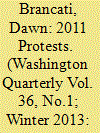

|
|
|
|
|
| Publication |
2013.
|
| Summary/Abstract |
In 2011, throngs of protesters took to the streets, often at great risk to their lives, to challenge the results of undemocratic elections across the globe-in Bahrain, Benin, Egypt, Haiti, Morocco, Nicaragua, Nigeria, and Russia. Outside of elections, pro-democracy protests also took place in 2011 in Cameroon, Libya, Malaysia, Swaziland, Syria, Tunisia, and Yemen, among other countries.
|
|
|
|
|
|
|
|
|
|
|
|
|
|
|
|
| 2 |
ID:
045349
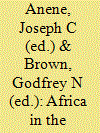

|
|
|
|
|
| Publication |
London, Ibadan University Press and Nelson, 1968.
|
| Description |
xvi, 555p.: plates, maps, figureshbk
|
|
|
|
|
|
|
|
|
|
|
|
Copies: C:1/I:0,R:0,Q:0
Circulation
| Accession# | Call# | Current Location | Status | Policy | Location |
| 003479 | 960.3/ANE 003479 | Main | On Shelf | General | |
|
|
|
|
| 3 |
ID:
140192
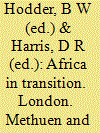

|
|
|
|
|
| Publication |
London, Methuen and co. ltd., 1967.
|
| Description |
x, 378p.:figureshbk
|
|
|
|
|
|
|
|
|
|
|
|
Copies: C:1/I:0,R:0,Q:0
Circulation
| Accession# | Call# | Current Location | Status | Policy | Location |
| 000535 | 916.04960/HOD 000535 | Main | On Shelf | General | |
|
|
|
|
| 4 |
ID:
115590
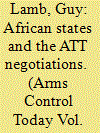

|
|
|
| 5 |
ID:
122424
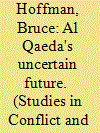

|
|
|
|
|
| Publication |
2013.
|
| Summary/Abstract |
This article considers the current state of the Al Qaeda terrorist movement and its likely future trajectory. It considers the principle assumptions both today and in the past about Al Qaeda and how they affect our understanding of the movement and the threat that it poses; Al Qaeda's current capacity for violence; and its ability to plan strategically and implement terrorist operations. The article further identifies nine key change drivers that will likely determine Al Qaeda's fate in the years to come before concluding that, even while the core Al Qaeda group may be in decline, Al Qaeda-ism, the movement's ideology, continues to resonate and attract new adherents. In sum, it argues that Al Qaeda remains an appealing brand most recently and most especially to extremist groups in North and West Africa and the Levant.
|
|
|
|
|
|
|
|
|
|
|
|
|
|
|
|
| 6 |
ID:
114966
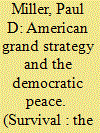

|
|
|
|
|
| Publication |
2012.
|
| Summary/Abstract |
It is commonplace to lament the United States' lack of a coherent grand strategy. Cold War historian John Lewis Gaddis argued in 2009 that the United States suffered from a 'grand strategic deficit' that went back two decades to the fall of the Soviet Union. Stephen Walt, a prominent International Relations professor at Harvard, blogged in 2010 that 'the United States tries to do more than it should, finds it much harder to set clear priorities, and tends to miss opportunities to "pass the buck" to others', the solution for which was 'a more lively public debate on fundamental issues of grand strategy'. Fareed Zakaria, then editor of Newsweek International, wrote in 2008 an article titled simply: 'Wanted: A New US Grand Strategy'.
|
|
|
|
|
|
|
|
|
|
|
|
|
|
|
|
| 7 |
ID:
106476
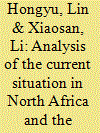

|
|
|
| 8 |
ID:
087551
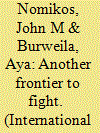

|
|
|
| 9 |
ID:
153870
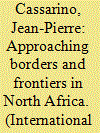

|
|
|
|
|
| Summary/Abstract |
Recent policy developments in the western Mediterranean, especially in North Africa, pose an important puzzle for our understanding of borders and frontiers and the ways in which they are politically addressed. This article sets out to analyse their various implications for patterns of interdependence among states, territoriality, sovereignty, mobility, and last but not least, for domestic politics. By drawing on a vast corpus, the study provides a broader interpretation of such implications which, as argued, cannot be captured with exclusive reference to securitization and processes of demarcation. This endeavour is important to explore how the power dimension in the borderland may interact with other dimensions of the border. Each disciplinary approach discussed in this study, including its heuristic devices, provides a valid explanation of the oft-cited disconnect that scholars have observed in North Africa between the territorially bounded ideal-type of the nation-state and the ways in which it is concretely translated, if not reinterpreted, by borderlanders. An important insight is to venture far beyond disciplinary dogmatism with a view to addressing an array of drivers (be they political, historical, social, economic and geostrategic) that propels bordering practices in North Africa and determines, by the same token, their effects on the ground.
|
|
|
|
|
|
|
|
|
|
|
|
|
|
|
|
| 10 |
ID:
145875
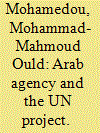

|
|
|
|
|
| Summary/Abstract |
Discussion of the contemporary Arab state system overlooks the engagement of the nascent League of Arab States with the debates about world politics and the purposes of the UN system emerging from World War II. The early experience of that body did not articulate a full expression of universalism, and the integrative cooperation of the Arab League was confined to a limited security policy framework. It did not subsequently seek lastingly to influence the nature of those ideas and institutions that would come to shape the United Nations. The Arab League was also never wedded to a Global Southern logic. Yet the UN has seldom been disavowed in the League’s diplomatic processes, which have been used by member states tactically as a conduit to maximise regional interpretations of the challenges from global order and as a forum for advancing the sub-region’s provincial interests.
|
|
|
|
|
|
|
|
|
|
|
|
|
|
|
|
| 11 |
ID:
110089
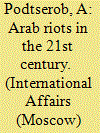

|
|
|
|
|
| Publication |
2011.
|
| Summary/Abstract |
THE WAVE OF POPULAR RIOTS which swept the Middle East and North Africa and which remains the key factor behind the regional developments engulfed not only the poor countries but also those which coped both socially and economically.
Between 2004 and 2009, for example, Tunisia increased per capita income from 3.5 thousand Tunisian dinars ($2.7 thousand) to 5 thousand TND ($3.9 thousand); its middle class (60% of population) accounted for 83% of total consumption; 80% were house owners; 21% had cars. In oil-rich Libya the year 2011 began very much as usual: foodstuffs and money were distributed among the poor; some families received free car coupons practically on the eve of the uprising.1
|
|
|
|
|
|
|
|
|
|
|
|
|
|
|
|
| 12 |
ID:
107214
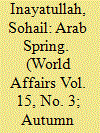

|
|
|
| 13 |
ID:
117537
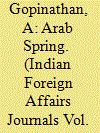

|
|
|
| 14 |
ID:
117824
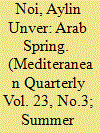

|
|
|
|
|
| Publication |
2012.
|
| Summary/Abstract |
In this article, Turkey's and the European Union's foreign policy approaches to the Middle East and North Africa region are analyzed by focusing on "normative power" and "soft power" concepts, the historical relations among the countries of the region, and the projects developed by the EU and Turkey. The Arab Spring and its repercussions on the EU's and Turkey's foreign policy approaches to the region, along with a brief historical background of the Turkey-EU relationship, are evaluated in order to determine whether Turkey should coordinate its foreign policy with the EU.
|
|
|
|
|
|
|
|
|
|
|
|
|
|
|
|
| 15 |
ID:
110161
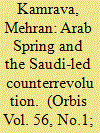

|
|
|
|
|
| Publication |
2012.
|
| Summary/Abstract |
The author contends that the Arab Spring has provided an opening for the Gulf Cooperation Council as a group and for Saudi Arabia as a long-time aspiring leader of the Arab world to try to expand their regional influence and global profile. An already weakened Arab state system, he argues, has been once again weakened by the sweeping wave of rebellion.
With its final chapter yet to be written, the Arab Spring of 2011 is likely to go down in history as a season of profound political changes that swept across the domestic politics of the Arab world. Even at this preliminary stage, that much is clear. What remains unclear, however, is how political change sweeping across the Middle East and North Africa is likely to alter the international relations of the Arab world in general and, in particular, the larger regional position and specific policy preferences of the Gulf Cooperation Council (GCC). Important considerations include the GCC's posture and profile vis-à-vis the Arab Spring, its collective reaction to the region-wide movements for political change, and its delicate relationship with its two troubled neighbors to the north, namely Iran and Iraq.
While the Arab Spring is unlikely to result in meaningful changes in Iran and Iraq's relationships with the GCC, it has fostered two discernible trends in the larger Arab world. First, Saudi Arabia has sought to reassert its position of prominence and leadership within the GCC. In fact, the kingdom has positioned itself as the chief architect of a counterrevolution to contain, and perhaps to even reverse, the Arab Spring as much as possible. Second, and an outgrowth of the first development, is the GCC's attempt to solidify its identity and mandate through the inclusion of additional Sunni monarchies-Morocco and Jordan-as a counterbalance, if not a substitute, to the Arab League.
|
|
|
|
|
|
|
|
|
|
|
|
|
|
|
|
| 16 |
ID:
112179
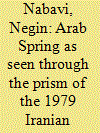

|
|
|
|
|
| Publication |
2012.
|
| Summary/Abstract |
Revolutions are by nature unpredictable and unsettling. That the wave of revolutions in North Africa and the Arab Middle East began so unexpectedly and spread with such speed, leading to the fall of the governments of Tunisia, Egypt, and Libya, has added to the concern regarding the "new order" that is to come after the initial euphoria. From the outset, the fear has been that these revolutions will follow the same trajectory as Iran did in 1979-in other words, that they will marginalize those who launched the revolutions and provide the grounds for the rise to power of the most savvy, purposeful, and best organized of the opposition groups, namely, the Islamists. Yet when one considers the recent uprisings in the Arab world through the prism of Iran's experiences in 1979, the parallels are not so evident. Mindful of the variations and distinctions between each of the revolutions in Tunisia, Egypt, and Libya, it would appear that in broad terms, and beyond superficial similarities, there is little in common between the events of Iran in 1979 and what has happened in the past year in the Arab world.
|
|
|
|
|
|
|
|
|
|
|
|
|
|
|
|
| 17 |
ID:
131235
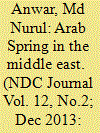

|
|
|
| 18 |
ID:
110469
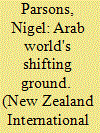

|
|
|
| 19 |
ID:
107213
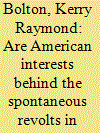

|
|
|
| 20 |
ID:
110266
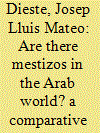

|
|
|
|
|
| Publication |
2012.
|
| Summary/Abstract |
Terminology devoted to miscegenation and inter-ethnic relationships is extremely problematic, and this article shows that many of these categories are more classificatory than descriptive. Some North African and Middle Eastern examples reveal that theoretical concepts about mixture reflect the folk conceptions of the observers rather that the meaning of local categories which not necessarily share those notions of mixture. In this sense, it is suggested that social categorizations of miscegenation are created from specific structures of descent which consider the transmission of two different social statuses, and that the pre-eminent unilineal descent systems of the Arab world should refrain from the political construction of such classification categories.
|
|
|
|
|
|
|
|
|
|
|
|
|
|
|
|
|
|
|
|
|